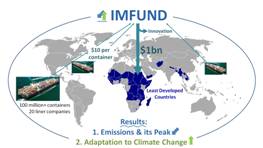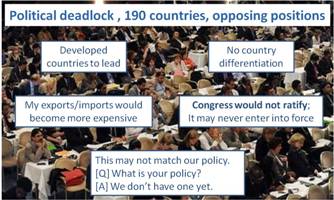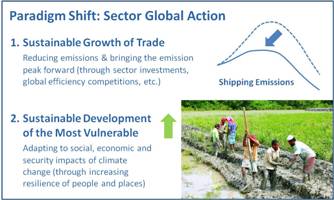IMFUND
 Simple and innovative financing mechanism to raise $1bn for sustainable growth and development by mobilising the international shipping industry
Simple and innovative financing mechanism to raise $1bn for sustainable growth and development by mobilising the international shipping industry
Climate change can no longer be ignored. Please Vote for the proposal at Pitch-to-Rich. From Monday,18th May, 9 am GMT until 4pm GMT on Wednesday 20th May 2015.
Container ships transport over 100 million containers and more than US$ 4 trillion worth of goods annually. International shipping is so large that its carbon emissions are double that of aviation. As it operates globally, outside of national borders, reducing its growing emissions is hard. Today, the world’s 190 governments cannot agree how to reduce emissions from international shipping; nor can they agree on additional sources of climate finance badly needed for the poorest countries. We are in a political deadlock.
The plan is to activate industry action without needing a political treaty. Working with the 20 liner shipping companies that represent 90% of global container vessel capacity, Dr Andre Stochniol wants to establish a transparent International Maritime Fund (IMFUND).
With a contribution of only $10 per container, more than $1bn could be raised annually. Part of this would be channelled to efficiency breakthroughs in shipping, which would save money for the shipping companies, and deliver significant climate benefits. The other part would be invested in climate change adaptation projects in some of the poorest countries of the world, improving the lives of millions of people.
The IMFUND proposal has been entered into the Pitch to Rich competition for innovative business ideas organised by Mr Richard Branson. Reaching the next stages of the competition would increase the visibility of the climate change challenge and global action needed. Winning the competition would bring the financing and advisory support required to formally propose the IMFUND mechanism at the Paris Climate Change Conference 2015 (COP21), and operationalise it in 2016.
Andre sees climate change as one of the greatest challenges of our time. For the last 8 years, he has dedicated himself to working tirelessly as part of the multilateral process to develop a global solution to climate impacts of international shipping and aviation. He has seen firsthand, the political and logistical obstacles in the process of reaching an agreement, and later ratifying it, by the world’s governments. He is convinced that only an industry led solution has the chance for much needed and comprehensive action on climate impacts of international shipping and would like your vote to prove that it is possible.
The proposal needs Your Vote. Please Vote for it at Pitch-to-Rich.
From Monday,18th May, 9 am GMT until 4pm GMT on Wednesday 20th May 2015.
For more details please watch the video above or read the Q&A below.
Thank You!
IMFUND Q&A
- What inspired the new idea?
- Deadlock and a deteriorating political context for multilateral progress;
- Recent developments in Africa and Europe, which have increased the likelihood of a patchwork of regulations for international shipping, something the industry strongly wants to avoid;
- Increasing openness to act on climate change from liner companies, such as Maersk.
- Deadlock and a deteriorating political context for multilateral progress;
- How could this idea disrupt a market?
- It would bring joint action on climate change in the international shipping sector, where governments have failed due to its global nature;
- Additional investment in innovation and efficiency improvements would reduce shipping fuel and thus emissions, over the short- and long-term, including bringing forward the emission peak, potentially by 10 years, avoiding more than 5 gigatons of CO2 emissions;
- 1$bn of climate finance could be generated for the most vulnerable annually, even with a contribution as low as $10 per container, impacting millions of lives.
- It would bring joint action on climate change in the international shipping sector, where governments have failed due to its global nature;
- How is this idea unique?
- Shipping companies act individually not as an entire sector. Yet significant benefits can be achieved through joint action, including reducing waiting times and congestion at ports;
- Shipping companies await a global regulation that is unlikely to materialise. If they don't act as an industry, a patchwork of regional and national regulations is the likely outcome - a nightmare scenario for the global industry to comply with, and without bringing any direct benefits to shipping;
- A simple contribution per container is proposed instead of a levy or market based mechanism based on ship fuel consumption. This is more transparent and acceptable to all stakeholders as it would not distort competition.
- Shipping companies act individually not as an entire sector. Yet significant benefits can be achieved through joint action, including reducing waiting times and congestion at ports;
- What are the revenue streams?
- Revenues would be generated from the contribution per container unloaded, proposed at US$10 per standard container (TEU). The contribution would be applicable to full containers. Given that well over 100 million containers are shipped internationally by sea, the total contributions would amount to more than US$1 billion;
- Payments for value added services and licensees from non-participants.
- Revenues would be generated from the contribution per container unloaded, proposed at US$10 per standard container (TEU). The contribution would be applicable to full containers. Given that well over 100 million containers are shipped internationally by sea, the total contributions would amount to more than US$1 billion;
- What is the market the idea will be entering? What is the Unique Value Proposition?
- International liner shipping is a global but concentrated industry. The top 10 and 20 companies represent nearly 70% and 90% of the global container capacity, respectively. Many of these already speak with one voice on environmental issues through the World Shipping Council, which represents 90% of the industry (WSC). The 28 companies represented by WSC carry over 100 million containers annually.
- Currently there is no alternative proposal, in particular involving long term innovation and bringing the sector's emisssion peak forward.
- International liner shipping is a global but concentrated industry. The top 10 and 20 companies represent nearly 70% and 90% of the global container capacity, respectively. Many of these already speak with one voice on environmental issues through the World Shipping Council, which represents 90% of the industry (WSC). The 28 companies represented by WSC carry over 100 million containers annually.
- What about key business questions: company benefits, free-riding versus sector benefits, and costs?
- Increased efficiency from additional investments would save money & offset the contribution per container. Even if this were not the case, company profits still not affected as costs passed on.
- Free-riding is constrained by access to benefits; the sector will win by avoiding a patchwork of regional regulations.
- The potential increase in import prices, if any, is estimated to be negligible: circa 0.03% (3 cents per $100).
- Increased efficiency from additional investments would save money & offset the contribution per container. Even if this were not the case, company profits still not affected as costs passed on.



